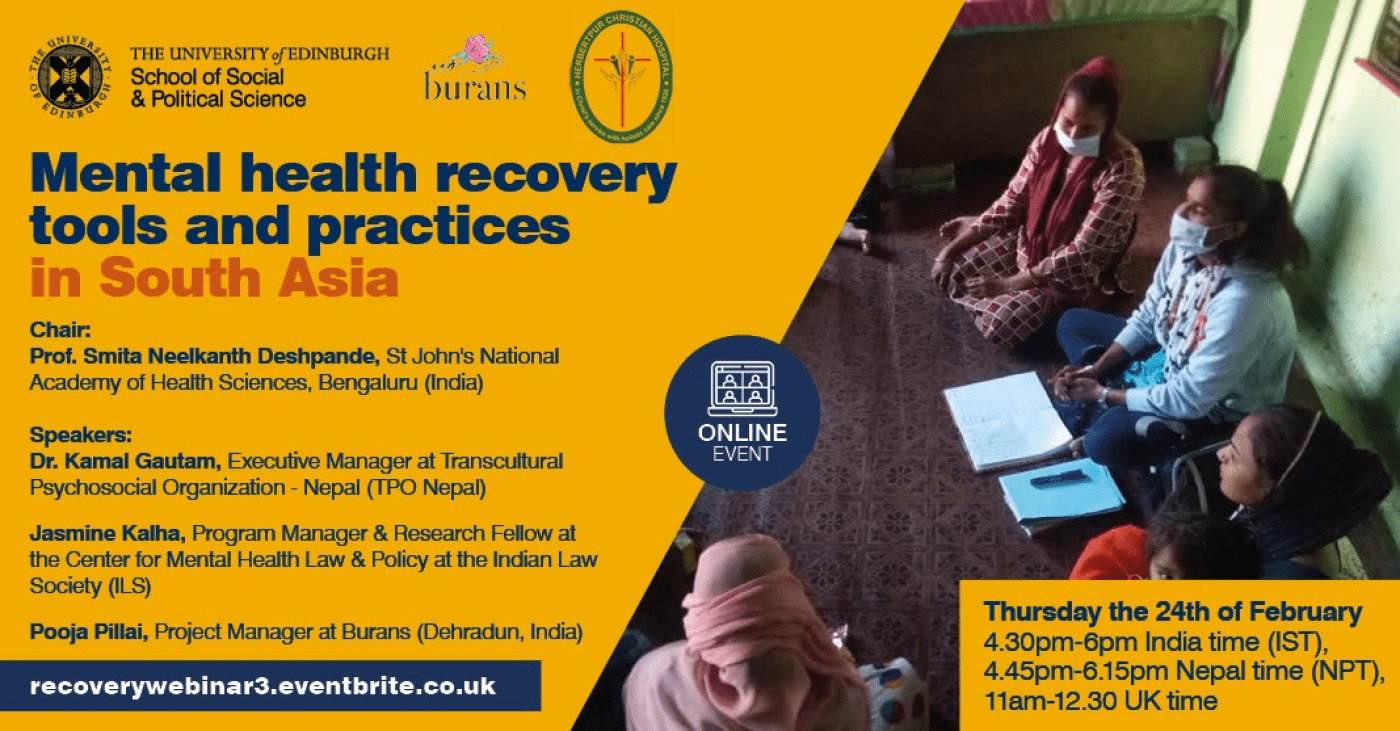Mental health recovery tools and practices in South Asia
Venue
Online eventMedia
Image

Description
In this third webinar of our global mental health webinar series, we learn about how different institutions working on mental health in South Asia conceptualize "recovery" and how they translate and instrumentalise these understandings into tools to support and assess mental health recovery.
Chair: Prof. Smita Neelkanth Deshpande, St John's National Academy of Health Sciences, Bengaluru (India).
Professor of Psychiatry, served as the Head, Dept. of Psychiatry, ABVIMS-DR RML Hospital, New Delhi from July 2004 to September 2018. Beginning with systems research in 1988, she led over 36 research projects in autism, schizophrenia genetics, clinical trials, psychosocial aspects, disability and rehabilitation, tobacco cessation, de-addiction, yoga for cognitive enhancement in schizophrenia and Implementation research for agencies such as the NIH, WHO, ICMR, DST and DBT, with more than 250 publications and innumerable presentations.
She participated in developing the Indian Scale for Assessment of Autism (ISAA) recognized by the Government of India for certifying disability for autism. She was a co-author in Tobacco Cessation Guidelines for Government of India.
She was a member for developing ICMR human research guidelines for vulnerable groups in 2017. She is on the board of several international journals. She is Co-Chair, World Psychiatric Association Section on Genetics. She is an international WHO trainer for Tobacco Cessation and has visited several countries to train their trainers.
Speakers:
Dr. Kamal Gautam (MBBS, MD Psych) is the Executive Director of Transcultural Psychosocial Organization Nepal, a leading mental health non-governmental organization in Nepal. He is a manager, technical expert and researcher. He has a sound expertise in designing, implementing and assuring quality of services of community based mental health programs. He has been involved as a technical expert within the organization as well as the Ministry of Health & Population in development and endorsement of various policies, guidelines and protocols. His contributions include technical assistance in the development and endorsement of National Mental Health Strategy & Action Plan, community mental health care package, training curricula for various cadres of health workers, capacity building and clinical mentoring of non-specialist service providers, revision of the essential drug list of psychotropics and adaptation and contextualization of WHO mhGAP Version 2 in Nepal. He also offers specialist consultation services at TPO Nepal and via outreach clinics in rural settings. He works directly with the policy makers, academicians and institutions for facilitating policy reforms on mental health. He has been involved in a number of research projects at TPO Nepal as Principal/Co-investigator. He has also been supervising students and interns from various academic backgrounds.
Jasmine Kalha on "Experiences of applying recovery-oriented mental health approach in India".
Jasmine is the program manager and research fellow at the Center for Mental Health Law & Policy at the Indian Law Society (ILS) in Pune (India). She is trained in social work from a gender perspective from the Tata Institute of Social Sciences, Mumbai, and has an MPhil in Sociology from the Delhi School of Economics, Delhi University. She has worked on implementing innovative research interventions at scale for mental health and human rights in low resource settings since 2014. She co-leads the scale-up and implementation of Atmiyata, a large rural community-led intervention to reduce the mental health care and social care gap. She co-leads the UPSIDES (peer support) project in Gujarat and is involved with the capacity-building work of SPIRIT (suicide prevention). She has also co-led projects on recovery and mental health in India. Previously, Jasmine worked on health systems reform through WHO’s QualityRights (QR), Gujarat. She continues to provide consultancy services to other LMICs for the implementation of QR.
Pooja Pillai will be presenting "Swasthya Labh Saadan (SLS) - a co-produced pictorial recovery tool used by people with psychosocial disability"
She is the project manager and a mental health professional working with Project Burans among low resource communities in North India. She uses her biomedical science and public health background to lead the Burans Dehradun team working among people with psycho-social disability. She is passionate about learning more on how gender and mental health interact, alongside other social determinants of health.
Key speakers
- Dr. Kamal Gautam (MBBS, MD Psych) - The Executive Director of Transcultural Psychosocial Organization Nepa
- Jasmine Kalha - Program manager and research fellow at the Center for Mental Health Law & Policy at the Indian Law Society (ILS) in Pune (India)
- Pooja Pillai - Project manager and a mental health professional working with Project Burans among low resource communities in North India.
Partner institutions
- Burans
